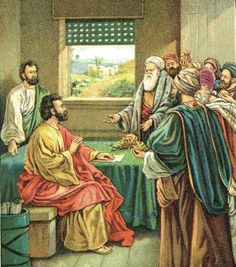
Shownotes
Welcome to Day 1391 of our Wisdom-Trek, and thank you for joining me.
I am Guthrie Chamberlain, Your Guide to Wisdom
Mastering the Bible – Gentile Inclusion and All Things in Common – Worldview Wednesday
Wisdom - the final frontier to true knowledge. Welcome to Wisdom-Trek where our mission is to create a legacy of wisdom, to seek out discernment and insights, and to boldly grow where few have chosen to grow before.
Hello, my friend, I am Guthrie Chamberlain, your captain on our journey to increase wisdom and create a living legacy. Thank you for joining us today as we explore wisdom on our 2nd millennium of podcasts. Today is Day 1391 of our trek, and it is Worldview Wednesday. Creating a Biblical Worldview is essential to have a proper perspective on today’s current events.
To establish a Biblical Worldview, you must have a proper understanding of God and His Word. Our focus for the next several months on Worldview Wednesday is Mastering the Bible, through a series of brief insights. These insights are extracted from a book of the same title from one of today’s most prominent Hebrew Scholars, Dr. Micheal S. Heiser. This book is a collection of insights designed to help you understand the Bible better. When we let the Bible be what it is, we can understand it as the original readers did and as its writers intended. Each week we will explore two insights.
Mastering The Bible – Gentile Inclusion and All Things in Common
Insight Sixty-Five: Gentile Inclusion in the People of God Didn’t Mean Hostility Towards Jews and Jewish Customs
The book of Acts and the ministry of Paul and his companions inform us that the people of God after the cross were not a new theocracy or a revived Israel on Old Testament terms. The family of God included believers, Jew and Gentile. Entrance only required faith in what Jesus accomplished by his death and resurrection.
From antiquity to our own day; however, the non-Jewish nature of the people of God has been misread in negative ways, even to the point of anti-Semitism. It is absurd to think that the New Testament endorses the hatred of the Jewish people. Even after the conference over Gentile inclusion in Acts 15, there is no evidence in Acts that Jews were taunted or prevented from preaching the gospel. The opposite was true.
Paul, a Jew in Philippians 3, addressed this both in word and deed. The gospel, said Paul, was for the Jew first and then the Gentile (Roman 1:16-17). In every place Paul visited on his missionary travels, he went to the synagogue first. If the Jews no longer had a special status, then his pattern seems odd. But Paul longed for the salvation of his countrymen (Romans 9:1-5).

Paul also expressed appreciation and even devotion to Jewish law and customs. He knew that the law was no substitute for salvation. It couldn’t be. Salvation is an unmerited gift (Ephesians 2:8-10; Romans 4:3-25). Nevertheless, he “delighted” in the law in his inner (redeemed) being (Romans 7:22). Paul circumcised Timothy before taking him along on a missionary tour to avoid the young man becoming an obstacle to the Jews that Paul would preach to (Acts 16:3). Upon his return to Jerusalem, Paul visited the temple (Acts 21:26-30), having taken a Nazirite vow of purification (Acts 26:23-36). This would make little sense if Paul believed Israel had been displaced by God, especially when going to the temple was such a dangerous thing for him to do.
Rather than setting Israel aside, the New Testament language should be understood in terms of gentile inclusion. God included the Gentiles into his family; he didn’t exclude Jews. Although modern-day “replacement theology” primarily focuses on the interpretation of eschatology, it has become a trendy excuse for anti-Semitic attitudes and political disdain for modern Israel. Politics is no aid to biblical understanding and should not become a filter for Scripture.
Insight Sixty-Six: The Early Chuch Did Not Practice Communism

Since communism is a socioeconomic theory put forth in the nineteenth century, thinking that the early church practiced communism seems anachronistic. It is. Yet ever since Karl Marx gave the world communism, people have filtered Acts 2:42-45 through his ideas.
All the believers devoted themselves to the apostles’ teaching, and to fellowship, and to sharing in meals (including the Lord’s Supper), and to prayer. A deep sense of awe came over them all, and the apostles performed many miraculous signs and wonders. And all the believers met together in one place and shared everything they had. They sold their property and possessions and shared the money with those in need.
One of Marxism’s most famous slogans seems to fit Acts 2 well, “From each according to his ability, to each according to his need.” But that takes Marxism and Acts 2 out of context.
Communism advocates several ideas that are foreign to Old and New Testament theology. It abolishes private ownership of property, seeks a classless society, and uses the power of the state to coerce the populace toward the fulfillment of both goals. There is no support in Scripture for these extremes. Two of the Ten Commandments presuppose private property and criminalize its theft (Exodus 20:15; Deuteronomy 5:21).
Wealth is the fruit of labor (Proverbs 10:4: 13:4). Inherited wealth is also not condemned (Deuteronomy 21:16: Proverbs 19:14). Financial inequality is the inevitable result of inequality in ability and giftedness, interest in wealth, a society’s opportunities for economic advancement (or lack thereof), and positive versus self-destructive personal decisions (Matthew. 25:14-30). While, in Jesus’s words, there will always be poor (John 12:8) and, therefore, unequal economic classes, God doesn’t disdain the poor. Instead, he is displeased when they are oppressed by the wealthy (e.g., Deuteronomy 24:14; Proverbs 14:31: Zecheriah 7:10; James 2:6).

Marxist interpreters of Acts 2 miss the obvious fact that everything we read in that passage was voluntary. There was no all-powerful (or ecclesiastical authority) state demanding redistribution of income and wealth. In Acts 5, believers were voluntarily selling property and distributing the proceeds among the believers. Even when Ananias and his wife sinned by deceptively withholding part of a property sale, Peter scolded, "And after it was sold, was it not at your disposal?" There is no coercion in this picture.
Acts 2 does not justify Marxist theory for another reason: it would contradict the teaching of Jesus. It was Jesus who spoke of the kingdom of heaven as distinct from the earthly state (Matthew 22:21). When we prefer (or insist) that the state fulfills tasks Jesus gave to us as disciples and servants, we dishonor the principle of his distinction. Care for others is a spiritual duty, not something to be handed off to secular authority.
That will conclude this week’s lesson on another two insights from Dr. Heiser’s book Mastering the Bible. Next Worldview Wednesday, we will continue with two additional insights. I believe you will find each Worldview Wednesday an interesting topic to consider as we build our Biblical Worldview.
Tomorrow we will continue with our 3-minute humor nugget that will provide you with a bit of cheer, which will help you to lighten up and live a rich and satisfying life. So encourage your friends and family to join us and then come along with us tomorrow for another day of our Wisdom-Trek, Creating a Legacy.

If you would like to listen to any of our past 1390 treks or read the Wisdom Journal, they are available at Wisdom-Trek.com. I encourage you to subscribe to Wisdom-Trek on your favorite podcast player so that each day’s trek will be downloaded automatically.
Thank you for allowing me to be your guide, mentor, and most importantly, your friend as I serve you through the Wisdom-Trek podcast and journal.
As we take this trek together, let us always:
- Live Abundantly (Fully)
- Love Unconditionally
- Listen Intentionally
- Learn Continuously
- Lend to others Generously
- Lead with Integrity
- Leave a Living Legacy Each Day
I am Guthrie Chamberlain reminding you to Keep Moving Forward, Enjoy Your Journey, and Create a Great Day Everyday! See you tomorrow!